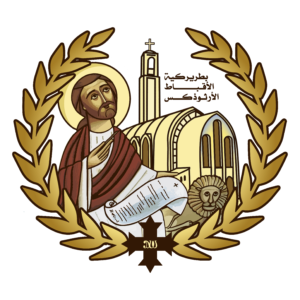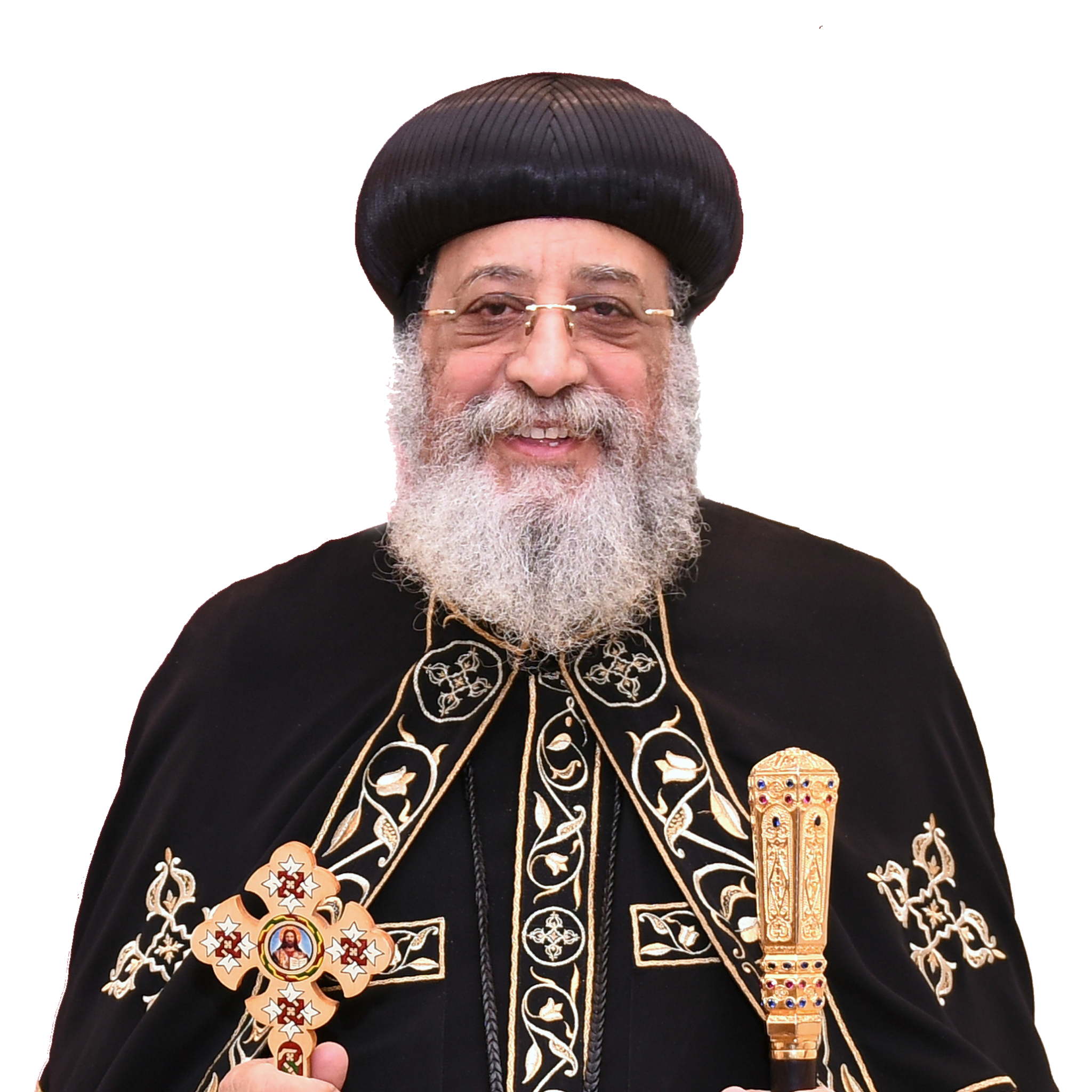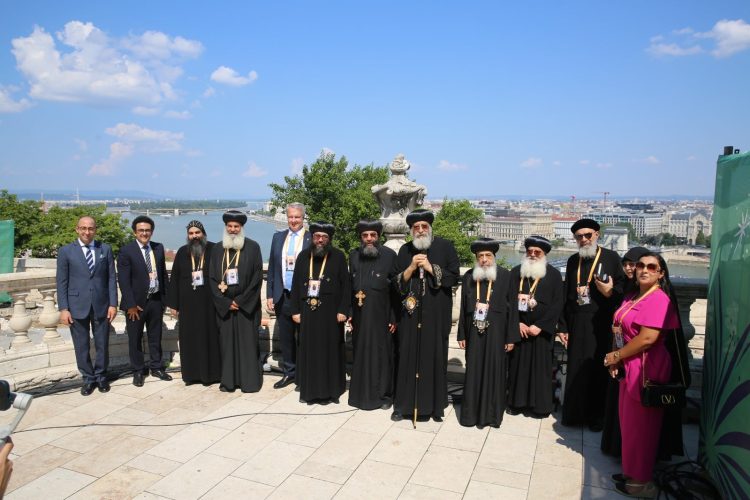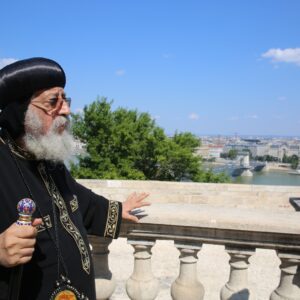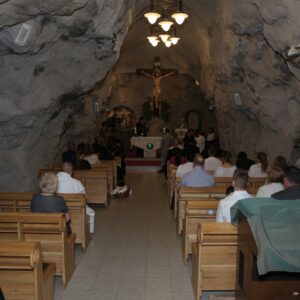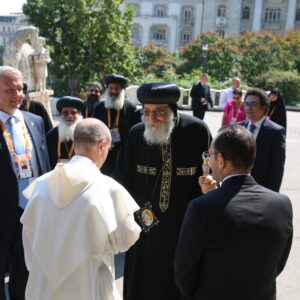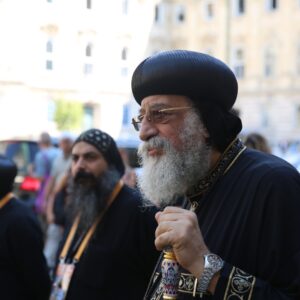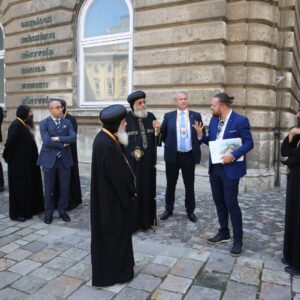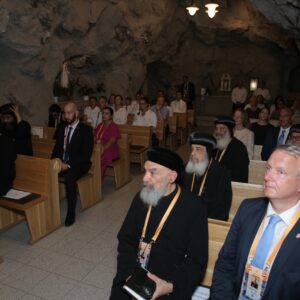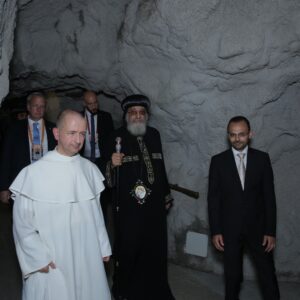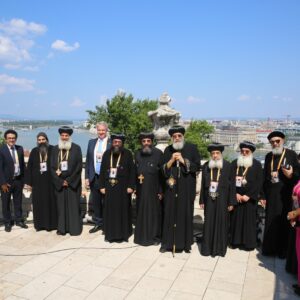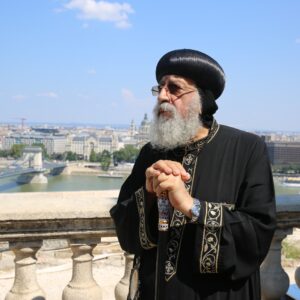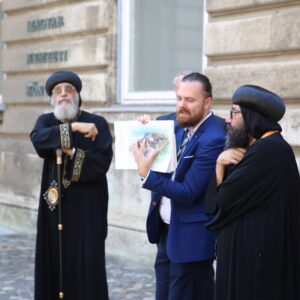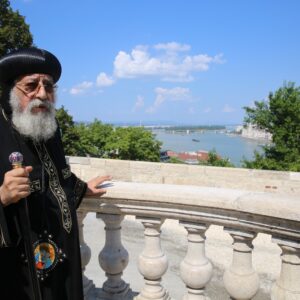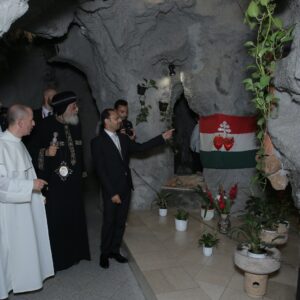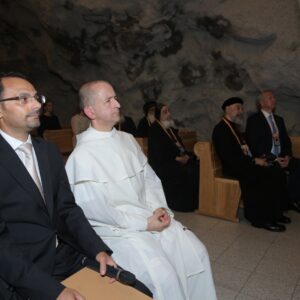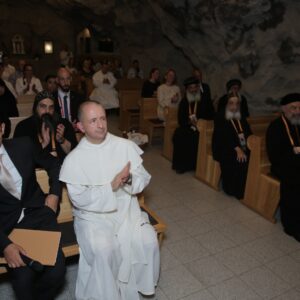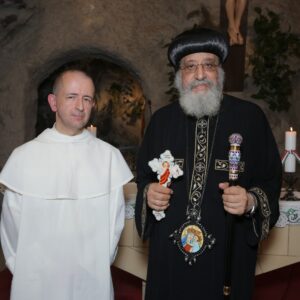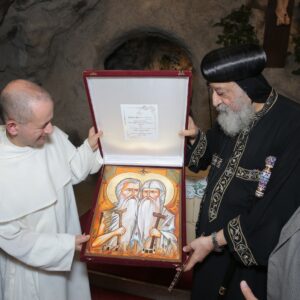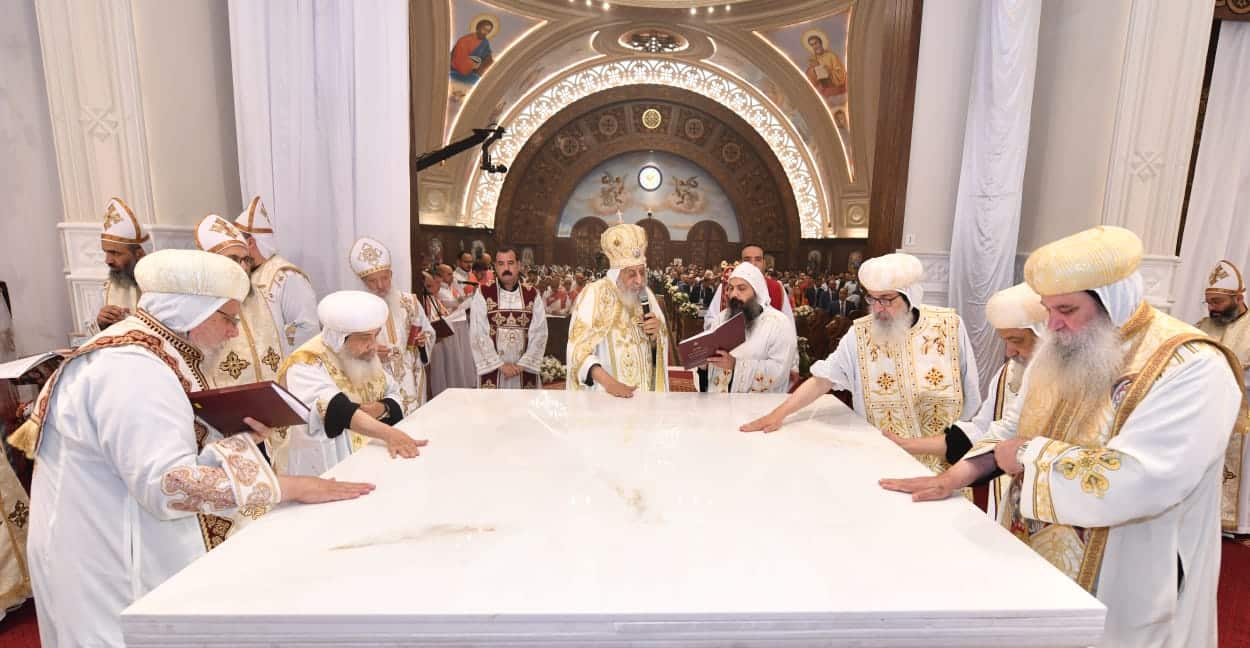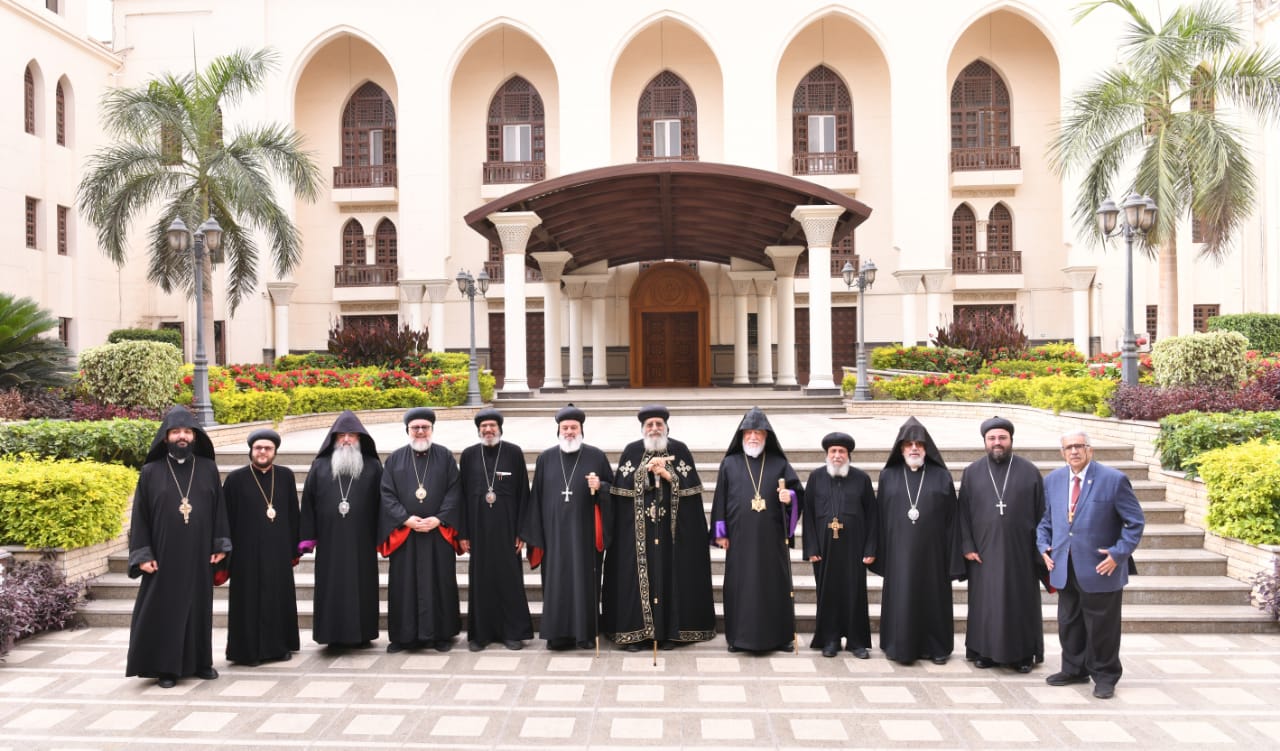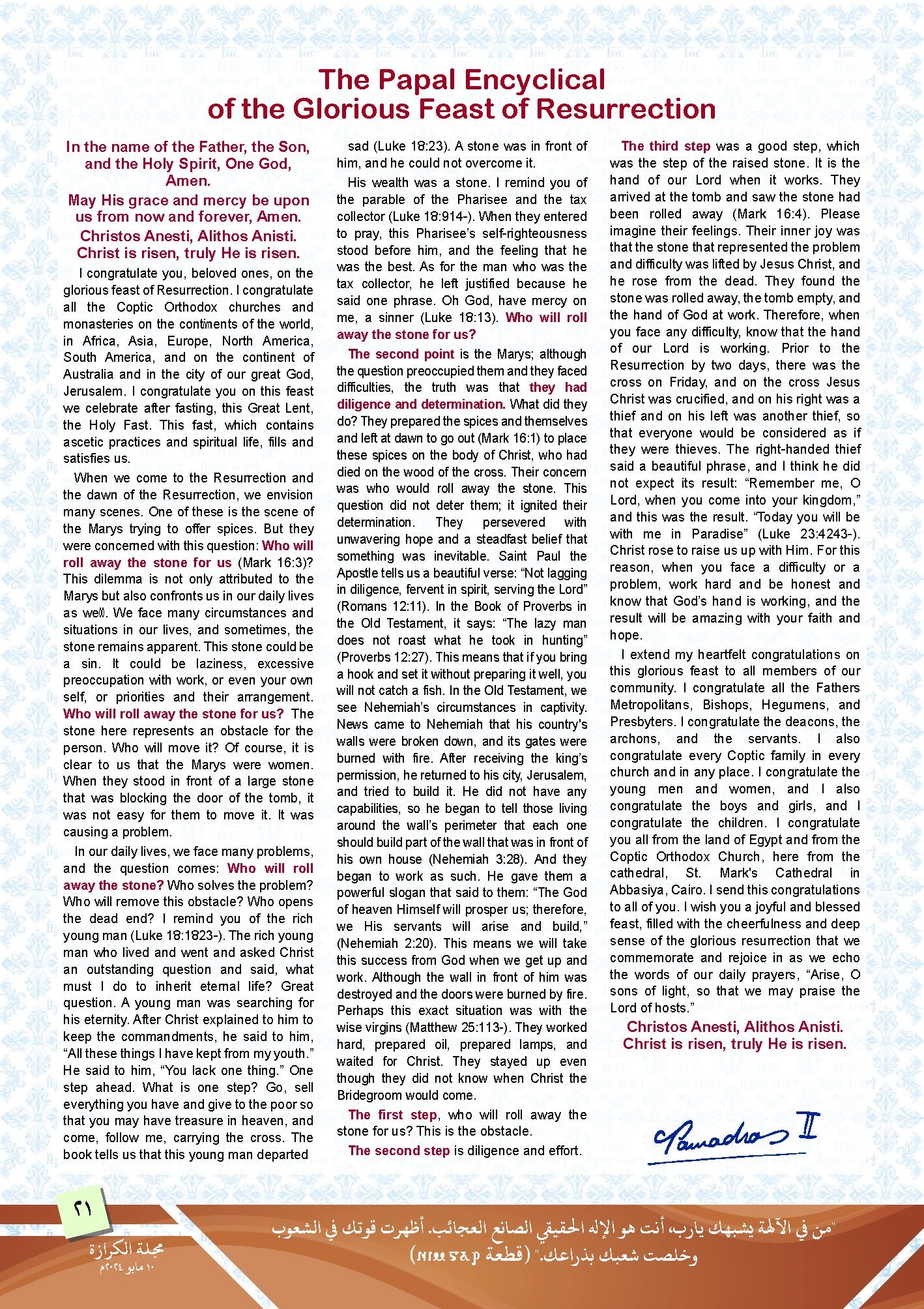His Holiness Pope Tawadros II visited this Sunday evening a monastery named after St. Paul in Budapest, on the second day of his official visit to Hungary.
His Holiness and the accompanying delegation were received by Father Sabulch, the former head of the monastery, and His Holiness the Pope listened to an explanation about the features of the monastery, in the outer courtyard of the monastery.
Then His Holiness went inside the monastery, where Father Sabulch gave a speech in which he welcomed His Holiness, conveying the greetings of the head of monasticism in Budapest and those who were absent from the audience due to their presence in a remote place to establish a new monastery, then he shed light on the monastery and its history.
His Holiness also delivered a speech in which he expressed his happiness at visiting a monastery bearing the name of an Egyptian saint, then he spoke in it of basic features of monastic life.
The monastery held a luncheon in honor of His Holiness the Pope.
At the end of the visit, His Holiness presented a souvenir, an icon of St. Anthony and St. Paul.
Text of the speech of His Holiness Pope Tawadros II on his visit to the Monastery of St. Paul in Budapest
In the name of the Father and the Son and the Holy Spirit, the one God. Amen.
Happy with this talk given by the blessed monk
Happy with the ancient history of this monastery
I rejoice with you that monastic life returned in 1989, and with the strong relationship between the abbot and the monastic fathers with H.G. Bishop Giovanni and Fr Youssef Khalil.
I am pleased with this beautiful visit and the official invitation from the Hungarian government and participating in the celebration of the National Day and the memorial of King St. Stephen. My happiness was also doubled when I knew that I would visit this monastery.
This happiness has many reasons
First: We are monks from the desert in Egypt and from several ancient Egyptian monasteries.
All the fathers, metropolitans and bishops who are with us, and the abbess of St. George’s Monastery for nuns in Old Cairo.
I am also fortunate that it (the monastery) bears the name of a saint that Egypt gave birth to, St. Paul.
We come to you from the land that gave birth to St Anthony, St Paul and St. Makarios.
The existence of a monastery in Europe bearing the name of an Egyptian saint is wonderful and reminds me of the verse that the Apostle Paul said:
“Now thanks be to God who always leads us in triumph in Christ, and through us diffuses the fragrance of His knowledge in every place.”
(II Corinthians 2:14)
The good fragrance (St. Paul) spread from Egypt to all of Europe. Monasticism, my beloved brothers, is an expression of strong love for Christ.
We speak the language of Christ’s love that binds us all, and the language of love is the origin of monastic life. Monastic life involves constant prayer, continuous reading of the Bible, practicing the church’s Sacraments, the Eucharist, and also in monastic life, calmness, meditation, and enjoying the company of Christ every day.
The monastic life above all this is the life of joy. The monk lives true joy and with this joy, he prepares for eternal joy.
I thank the abbot of this monastery that is full of monks.
I thank the blessed father who gave us the history of the monastery, I thank the good opportunity, and I hope that some of the monks of this monastery will visit us and go to our monasteries.
Thank you all,
May the name of the Lord be blessed in your lives.”
Speech of Father Sabulch’s during the reception of His Holiness Pope Tawadros II at the Monastery of St. Paula in Budapest
His Holiness, Pope Tawadros II, Pope of Alexandria and Patriarch of the See of St. Mark, and the delegation accompanying your Holiness, my greetings, allow me to convey to you the greetings of the head of monasticism in Budapest, and those who were absent from attending because they were in a far place to establish a new monastery.
I was the abbot of the monastery before, and you have honoured the sons of St Paul with your presence today.
St. Paul is our saint and our intercessor, he was the patron saint of the state of Hungary in the eighteenth century, where it was preferred for kings to mention St. Paul, when monasticism flourished in the eighteenth century after the end of the Turkish occupation.
There was no monasticism in Hungary, and monasticism and spirituality moved to Poland in the twentieth century then the monks returned. This church is the fruit of the return of the monks. In the history of our monasticism, there have been many destructions, but it has returned again. In the Middle Ages, beside St. Paul, there were many saints from the Coptic Church, including St. Macarius the Great. Our ancestors did not put the statue of St. Paul only, but of St. Anthony, and there is a picture of St. Mary the Coptic. Through our monasticism, St Paul became the patron saint of Hungary.
Your Holiness, the Pope, you have arrived at your home here in the monastery. Your Holiness is considered the Pope of all the monks.
H.G. Bishop Giovanni is our father, as well as our Fr Youssef.
I can say that organizing such a meeting with Your Holiness indicates the work of the Holy Spirit
We live in special times.
After the murder of Bishop Epiphanious in 2019, our church joined in praying for the Coptic Church.
Our concern is to strengthen our relationship with God and wait for Christ. Our culture may be different, but our goal is the same. One of the Coptic monks told me that we speak a common language, which is the language of Christ.
When I was the abbot of the monastery, I was honoured to visit the Coptic Church in Hungary, and in 2016 I visited the monastery of St. Paul and St. Anthony in Egypt. I also visited the monastery of St. Bishoy on another visit in 2018, and I visited Your Holiness at the Papal Residence with a Hungarian delegation. I also visited the churches of Old Cairo H.G. Bishop Danial, abbot of St. Anthony’s monastery in the Red Sea also have visited us.
Your Holiness the Pope, I consider this relationship very important. We are brothers in Christ, and not only this, but we also have a common intercessor, St. Paul.
I express my happiness with this visit.
This page is also available in:
العربية
